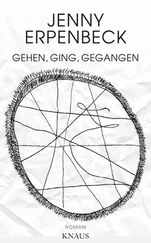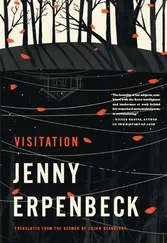Jenny Erpenbeck - The End of Days
Здесь есть возможность читать онлайн «Jenny Erpenbeck - The End of Days» весь текст электронной книги совершенно бесплатно (целиком полную версию без сокращений). В некоторых случаях можно слушать аудио, скачать через торрент в формате fb2 и присутствует краткое содержание. Год выпуска: 2014, Издательство: New Directions Publishing, Жанр: Современная проза, на английском языке. Описание произведения, (предисловие) а так же отзывы посетителей доступны на портале библиотеки ЛибКат.
- Название:The End of Days
- Автор:
- Издательство:New Directions Publishing
- Жанр:
- Год:2014
- ISBN:нет данных
- Рейтинг книги:4 / 5. Голосов: 1
-
Избранное:Добавить в избранное
- Отзывы:
-
Ваша оценка:
- 80
- 1
- 2
- 3
- 4
- 5
The End of Days: краткое содержание, описание и аннотация
Предлагаем к чтению аннотацию, описание, краткое содержание или предисловие (зависит от того, что написал сам автор книги «The End of Days»). Если вы не нашли необходимую информацию о книге — напишите в комментариях, мы постараемся отыскать её.
The End of Days — читать онлайн бесплатно полную книгу (весь текст) целиком
Ниже представлен текст книги, разбитый по страницам. Система сохранения места последней прочитанной страницы, позволяет с удобством читать онлайн бесплатно книгу «The End of Days», без необходимости каждый раз заново искать на чём Вы остановились. Поставьте закладку, и сможете в любой момент перейти на страницу, на которой закончили чтение.
Интервал:
Закладка:
With an armful of linens she now leaves the baby’s room and walks past the footstool where her daughter is sitting. It was no accident that she married her daughter to a Christian. When her daughter was old enough to ask questions, she told her that her father had just gone off one day and never returned. Why did he leave? Where did he go? Will he come back again some day?
New panes of glass were set into the bookcase. She sold the house in the ghetto and moved to the center of town, where she took over her husband’s business and set aside everything she could spare for her daughter’s dowry. For many years now she has known something that her daughter will soon be forced to learn: A day on which a life comes to an end is still far from being the end of days.
4
So now something he has suspected his entire life, especially these past three years, has become glaringly obvious: If you get even the slightest bit off track, the consequences in the end are just as inescapable as if you’d gone and leapt headfirst into this or that abyss. As an Imperial and Royal civil servant responsible for a thirty-five-kilometer stretch of the Galician Railway of Archduke Karl Ludwig, he knew that everything depended on his ability not only to produce order, but to maintain it where it already existed. But in his own life, life had always intervened. During the year he spent as a trainee not yet receiving a salary, his hunger had caused him to incur debts. So by the time the year ended and he assumed his post as a regular civil servant of the eleventh — i.e. lowest — pay-grade, he was already deep in debt. His hunger, to be sure, was a sign he was still alive, as was his freezing during that first winter — but now his debts would count as a demerit when he underwent his Confidential Qualification, an evaluation carried out behind closed doors by his superiors. Thus, it was impossible to say when he would be promoted from the eleventh to the tenth pay-grade and be able to start paying back what he owed; no one would discuss this with him. In short, he had no prospect of making the leap back to ordinary life. Hunger and freezing guaranteed more hunger and freezing, that’s how it was when life got the upper hand even once. Then he’d met the Jewish shopkeeper and her daughter, whose skin was so white it would have blinded him like snow if he’d been a bug crawling around on it. If only he’d been able to see where the track was and where it wasn’t when he proposed to her. There’s no paying down debts with a Jewish dowry, even if you pay them down. And there are differences. You can recognize them by the silence surrounding you at the clubhouse or the office. This silence has to do with consequences, with the end in general — he’s come to understand this, having finally grasped it now that the end is staring him in the face. Why was the baby so quiet all of a sudden?
His father hadn’t come when they got married at the civil registry office, nor for the birth of their child. He said the trip was too long and too expensive. It had been three years since he’d seen him last, and if all went well, he might never have to see him again. The morning after the child’s birth, he’d gone to an inn alone and toasted the newborn with strangers, and while he was swirling the schnapps around in his mouth with his tongue before swallowing it, savoring the taste, it occurred to him that his tiny daughter also had a tongue in her mouth, she’d come equipped with her own insides when she slipped out of her mother, emerging from her mother’s concavity with concavities of her own. He, the civil servant, eleventh class, had begotten a living thing, and no Confidential Qualification was required to verify this fact.
Two hundredweights of twine are required to adorn the Brody station with flowers in honor of the Kaiser, whose train will be passing through. Thick oak planks fifteen centimeters across to replace the ties between the tracks. Six hundred gulden a year is the salary of a civil servant eleventh class, while a civil servant tenth class receives eight hundred and if he’s lucky another two hundred as a bonus. But what to do with all the things that resisted calculation? How much time was there really between the second when a child was alive and the next, when it was no longer alive? Was it even time separating one such moment from another? Or did it have to be given a different name, except that no one had found the right name for it yet? How could you calculate the force dragging a child over to the realm of the dead?
He can still remember the moment when he imagined for the first time what the white cleft between his bride’s legs must look like, fleshy and firm, and when he spread it apart with his fingers, the tiny red rooster’s comb would appear. Later, when she was his wife, he loved the sounds their two sweaty bodies made when they rubbed together and pulled apart again, slapping and smacking, their mouths, tongues, and lips all flowing together, sucking at one another to transform two formerly separate beings into a single moist concavity of flesh. Flesh, flesh — sometimes the word alone was enough to arouse him. But ever since the night before, when he took the lifeless child from his wife’s arms and laid it back in its cradle, he knows how cold something dead feels, colder than he would have ever expected. He doesn’t know how he can forget this. He, the civil servant, eleventh class, has begotten something dead, and no Confidential Qualification is needed to confirm this.
Sunlight falls on the rough pine floor of the inn where he is sitting. When he arrived before dawn, there were still a couple of Russian deserters lying under the tables asleep. While he was downing his first glass of spirits, and then the second, and the third, they woke up, gathered their bundles, and left in the company of a short, bald-headed man who’d appeared at daybreak, apparently by prearrangement. Neither the bald-headed man nor the others spoke much, nonetheless it was clear that these Russians — a sort you often saw in public houses like this — were men who’d made up their minds not to turn back. After his experience of the night before, the civil servant, eleventh class, finds himself suddenly understanding what it means to cross a border like that, what it means to no longer have any possibility of retreat. It’s as if the top layer were crumbling away from everything he sees and encounters, this layer that had previously gotten in the way of his comprehension, and now, like it or not, he is forced to recognize what lies below and to endure this recognition — but he can’t imagine how.
Sometimes, looking at his baby, he had wondered where it came from, where it had been before its mother conceived it. Now he wishes it made no difference whether the child had appeared — remaining only for the most infinitesimally fleeting bit of time — or had never appeared at all. But no, there was a difference. Using his thumb, he rubs a shiny coat button shiny. Since there was no measurement that applied to the difference between life and death, the dying of this tiny child was as absolute as any other dying. Never before has measuring — his profession, after all — seemed so superfluous to him as on that morning. Should he pull everyday life back on over his head now that he has understood it is nothing more than a garment?
He’d shouted at his wife because — although she’d picked up the baby, trying to comfort it — she hadn’t known what to do, hadn’t known any remedy for death, but he had also shouted because he too had known no remedy for death.
He, the civil servant of the lowest possible class, had been no match for Death.
And now?
The short, bald-headed man returns to the pub, sits at a table near the Imperial and Royal civil servant he’d seen there earlier that morning when he came for the Russians, and nods. The civil servant had carelessly tossed his coat with the gold buttons over an empty chair; if it were not for this coat, the bald-headed man wouldn’t have known that this person he saw sitting here ought to have been sitting in an office by this hour. The civil servant is unshaven, the tips of his mustache soiled, he is wearing no necktie, and there is a full glass of spirits before him yet again as he gazes out the window at the street, where some mongrel is running in circles trying to catch its own tail, occasionally sliding on a frozen puddle, the mongrel stumbles around before finding its footing and then goes back to hunting down its own scruffy posterior. The bald man orders a snack — pickled herring along with a beer — and settles down contentedly. He isn’t ruling out the possibility of striking yet another deal here this very morning.
Читать дальшеИнтервал:
Закладка:
Похожие книги на «The End of Days»
Представляем Вашему вниманию похожие книги на «The End of Days» списком для выбора. Мы отобрали схожую по названию и смыслу литературу в надежде предоставить читателям больше вариантов отыскать новые, интересные, ещё непрочитанные произведения.
Обсуждение, отзывы о книге «The End of Days» и просто собственные мнения читателей. Оставьте ваши комментарии, напишите, что Вы думаете о произведении, его смысле или главных героях. Укажите что конкретно понравилось, а что нет, и почему Вы так считаете.












